Seven Things D1A Commish Kevin Battle Wants You To Know
Seven Things D1A Commish Kevin Battle Wants You To Know
A Q&A with D1A commissioner Kevin Battle.
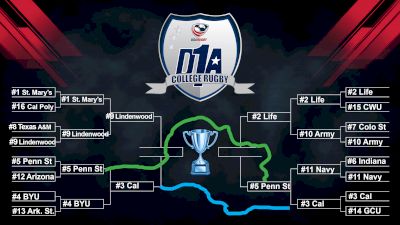
The D1A Conferences start play in a couple of weeks for the earliest ones, so it's time to have a look at D1A rugby and what the heck it's thinking.
FloRugby sat down with D1A Commissioner Kevin Battle, and we touched on seven major topics:
1. Can D1A players play in the MLR and retain their eligibility?
2. Is college rugby relevant as a talent pipeline for MLR?
3. What is a player's time window to play college rugby?
4. Are players and coaches paying attention to player eligibility status?
5. How much money does D1A handle and where does it go?
6. Why did D1A shift the semifinal matchups last spring?
7. Do women have a place in the D1A model?
The Pro Question
Flo: Can a player play in Major League Rugby and retain college eligibility?
Battle: No. The rule is very clear:
“A student-athlete is not eligible for participation in collegiate rugby if they have ever taken pay for competing in any form of rugby.”
So an undergrad has the temptation to play on the MLR — the message is, if you play for that team, you will lose your eligibility
Correct.
And this is about competing, not, for example, working in a rugby camp during the summer — you can be paid for being a coach at a camp.
Correct.
But if you train in an academy setup and learn from them . . .
We’re happy with that. But you have to make the distinction between training and playing. Training with a professional team is fine and any young man who wants to gain greater experience — that won’t affect his eligibility. But he can’t play a game for that team.
There are some scenarios wherein a player could receive some money for play
Yes, the rules distinguish between prize money and pay. A team that wins prize money can use that money to defray reasonable expenses for a player. In addition, a select side or touring side could offer to cover expenses provided they are reasonable and not exceed the actual expense or cost associated with the student-athletes travel and participation.
There is also a long-standing precedent in college sports that anyone competing with a national team is eligible to receive stipends. For USA Rugby, that typically can be anywhere from $100 to $150 a day.
Scholarships and work-study grants are also allowed.
Now the NCAA says you can’t train with a pro team or pro players. Does that make sense?
We don’t want to go that far, nor do we have the bandwidth or resources to enforce. We don’t want to restrict players’ opportunity to training with professional teams. But we certainly understand there’s a slippery slope. Right now we’re saying that if you’re paid to play — you lose your college eligibility.
Now some proponents of Major League Rugby say this goes too far. You are preventing talented rugby players from pursuing a dream, and if a student’s college season is over, why can’t he play some MLR games?
Well, first of all, we’re not talking about very many players. We might be talking about one percent of players, and I think that’s a little high. I don’t think one percent of the membership of D1A Rugby — which is what we’re talking about — is a very good reason to start changing long-standing rules.
Plenty Of Talent Anyway
Yes, let’s do the numbers. How many D1A players are there?
There’s just over 4,000 student-athletes. So if you took the top 10 percent, you’re at over 400. Let’s just say you took the graduating seniors who are, for argument’s sake, a quarter of all of the participants. So there are 1,000 graduating seniors the MLR will have to choose from. If you just take the top 10 percent, you’ve still got 100.
Numerically, it doesn’t even make sense to spend your time with college undergrads when you have more than enough players who are physically and emotionally more mature, have graduated, and are older. And that’s not counting D1AA, D2, or NSCRO
If we measure the MLR to 12 teams and the top 100 D1A players are looking to join, that’s eight players per MLR team. And we don’t think any team will have eight starting positions or regular squad positions open. Even if we look at the one percent of undergraduate players who might wish to play pro — that’s roughly 30 players … a lot. I don’t think we’re talking about more than 10.
Correct. I think certainly you can build a pool of players from the graduating seniors. And if each team can pick up a half a dozen graduating seniors to build, that would work for them.
So we’re not going to see any change in that. No professional rugby for college players if they want to keep playing college rugby.
I don’t think we look at changing a fundamental principle of college sports. To those few, you have to make a choice. Are you in college to get a degree or are you trying to play professional ball?
Time Keeps On Ticking
What about how much time to play in college? It seems like some think it’s an automatic thing that you have seven years in which to play five, but is that so?
D1A has been stricter than USA Rugby in this, and the rule is that you may get up to seven years to participate in five for reasons such as religious or military service, financial hardship, or you were not enrolled in school. But you have to apply for a waiver each time. It’s not automatic.
Know Your Status
Is the biggest problem that coaches apply for a waiver and then put a player on the field before there’s a response?
Some coaches see a player who they believe deserves a waiver and thinks he is automatically able to play. But you’re supposed to apply for the waiver and receive an approval before the student-athlete participates. The waiver is a request to waive the existing regulations because of extenuating circumstances.
If you play a player who needs a waiver with the expectation that he will get it, you’re rolling the dice, and you might end up forfeiting every game he plays in.
What about players? We’ve heard stories of players who end up giving wrong information, and you wonder if they are just telling a coach what he wants to hear.
For coaches, there’s that old saying, trust but verify. In some cases the players don’t fully understand their status, so asking a player if he’s eligible to play isn’t enough.
Are you full-time? Have you been to school somewhere else? Your registrar can usually help with that.
We see that foreign players get a bit of a favorable ruling when playing for an academy, but it’s not the same with graduate students, is it?
College rugby is meant for college undergrads. A fifth-year undergrad is accepted within our eligibility regulations. We extend the same acceptance to a fifth-year student who is continuing his education and pursuing a graduate degree. We draw the line at foreign students coming to grad school in the US, attempting to enter an undergraduate competition.
This can still be difficult and confusing — how are you navigating all of these aspects of the rules?
It can be confusing. We have a very strong eligibility committee made up of coaches, administrators, and at least one college athletic director. We also have two levels of appeal and a grievance process providing additional checks and balances. The committee operates under this doctrine: "When in doubt, err on the side of allowing the student to play."
Follow The Money
OK, on to other things — funding. Do you consider D1A separate from USA Rugby, and are D1A finances separate from USA Rugby?
We are members of USA Rugby and we need to be responsible for our own finances. If the national teams go over budget, that shouldn’t have an impact on college, youth, or high school, but it does under the current system. We have a product in D1A that is a revenue generator. It is our duty to maximize this.
What is the D1A budget?
Our budget is north of $300,000 annually. Payment for referees is our top expense, followed by financial support for teams in the playoffs. We feel strongly that programs should not be financially punished for success. Our goal is 100 percent financial support for playoff teams. We will achieve this in the next few years.
Our teams spent a combined total of just over $250,000 for post-season travel. We were able to cover a third of those costs.
About Those Playoffs
You talk about financial support of playoff teams, and that leads us to the great Semifinal Flip-Flop. D1A decided to change the semifinal matchups from Cal at Life and Penn State vs Lindenwood (in Moraga, CA), and instead had Lindenwood vs Cal (in Moraga), and Penn State at Life. Was the change worth it?
To have live broadcast we needed to have the locations reserved in advance. And we selected the venues based on getting local support for the events and butts in seats. When a game is played and the stadium has few fans there, the optics national television are not so positive. One way to guarantee there is no more college rugby on TV is to have empty stands.
So we made the change to have a Bay Area team stay in a Bay Area venue. We also saved some money, as Penn State didn’t have to travel as far, and Cal didn’t have to travel at all. On a side note, it wasn’t widely reported, but Cal stepped up and assisted with some of Lindenwood’s travel expenses. I thought this was very noble of them, and one of the many reasons I am proud to be associated with D1A.
As far as was it worth it based on the criticism we received? I don’t know. We did it in the best interests of rugby.
Would playoff expenses be easier to manage if we knew more playoff teams in advance, and perhaps regionalized things more?
Of course. We are looking into some regionalization of the first few rounds for this upcoming season. However, the only guarantee to the post-season is to win your conference. Conference championships should mean something. Teams that don’t win their conference still have an opportunity to earn an at-large invitation based on their body of work. Unfortunately, that can be somewhat subjective.
What About The Women?
A quick aside - you talk about the D1A product being a revenue generator. Would you think that the elite level of women’s college rugby is the same? Do you see a time when D1A and D1 Elite (or something like it) work together?
Without a doubt. I don’t know how that would look but I also don’t know how our sport succeeds without a partnership with women’s elite-level D1 rugby.
Editor's note: Notre Dame College backed out of the 2017-18 D1A playoffs after being denied a seeding switch to allow for a less expensive first-round game (going to Life University instead of the West Coast.) Normally, dropping out of the playoffs would incur the offending program a severe penalty, but considering this was NDC's first year in the league, and D1A changed the bracket rather drastically for other reasons later on, the Falcons received no penalty and will be eligible for playoffs this season.
Related Content
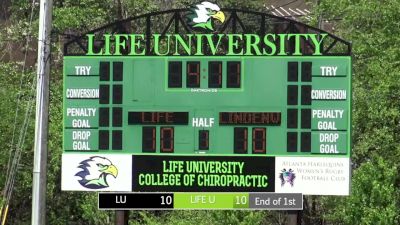 Replay: Life vs Lindenwood | Apr 13 @ 1 PM
Replay: Life vs Lindenwood | Apr 13 @ 1 PMApr 13, 2024
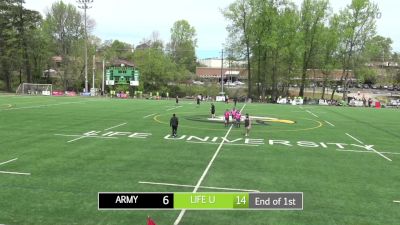 Replay: Life vs Army | Apr 6 @ 1 PM
Replay: Life vs Army | Apr 6 @ 1 PMApr 6, 2024
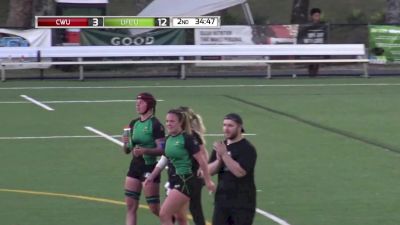 Replay: Life vs Central Washington | Mar 30 @ 7 PM
Replay: Life vs Central Washington | Mar 30 @ 7 PMMar 31, 2024
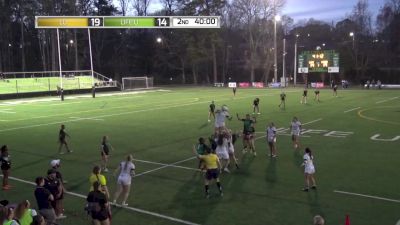 Replay: Life vs Lindenwood | Mar 16 @ 7 PM
Replay: Life vs Lindenwood | Mar 16 @ 7 PMMar 17, 2024
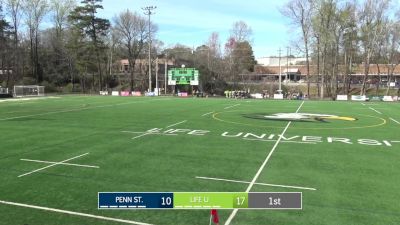 Replay: Life vs Penn St | Mar 16 @ 4 PM
Replay: Life vs Penn St | Mar 16 @ 4 PMMar 16, 2024
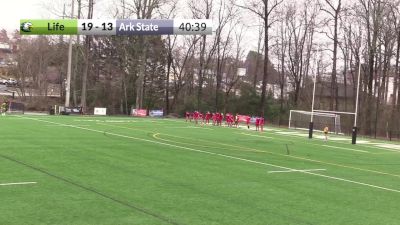 Replay: Life vs Arkansas St | Mar 2 @ 2 PM
Replay: Life vs Arkansas St | Mar 2 @ 2 PMMar 2, 2024
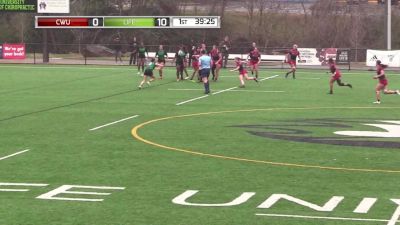 Replay: Life vs Central Washington | Mar 2 @ 11 AM
Replay: Life vs Central Washington | Mar 2 @ 11 AMMar 2, 2024
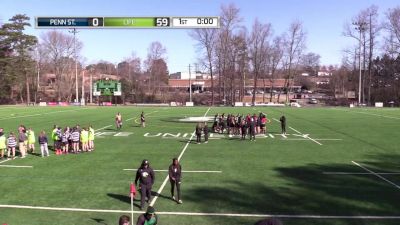 Replay: Life vs Penn State | Feb 25 @ 10 AM
Replay: Life vs Penn State | Feb 25 @ 10 AMFeb 25, 2024
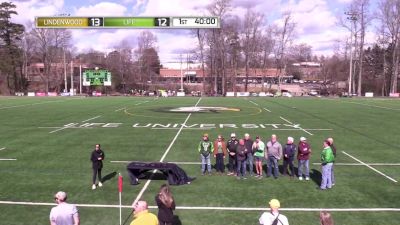 Replay: Life vs Lindenwood | Feb 24 @ 1 PM
Replay: Life vs Lindenwood | Feb 24 @ 1 PMFeb 24, 2024